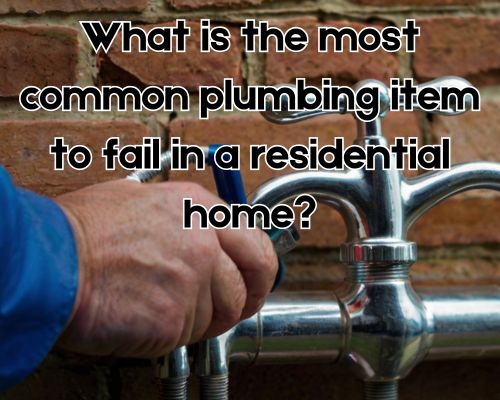Plumbing issues are an inevitable part of homeownership. In Australia, where environmental conditions and water quality vary greatly, certain plumbing components are more prone to failure than others. Understanding these common issues can help homeowners take preventive measures and avoid costly repairs. In this article, we explore the most common plumbing item to fail in Australian residential homes, the reasons behind it, and how to prevent major breakdowns.

The Most Common Plumbing Failure: The Hot Water System
Among the many components in a home’s plumbing system, the hot water system is the most common to fail in Australian residences. Whether it’s a gas, electric, or solar-powered system, hot water units have a finite lifespan and are heavily used, leading to wear and tear over time.
Why Do Hot Water Systems Fail?
- Sediment Buildup – Many Australian homes, particularly those in regions with hard water, experience high levels of mineral deposits. Over time, sediment accumulates in the bottom of the water heater tank, reducing efficiency and causing overheating, which can lead to failure.
- Corrosion and Rust – The anode rod inside a hot water system is designed to attract corrosive elements, preventing rust from forming on the tank. If not replaced periodically, the tank itself begins to corrode and eventually leaks.
- High Water Pressure – Excessively high water pressure can strain plumbing components, particularly hot water systems. This pressure can cause leaks, burst pipes, and premature wear of internal components.
- Age and Wear – Most hot water systems have a lifespan of 8-15 years, depending on usage and maintenance. Over time, seals, valves, and heating elements deteriorate, leading to leaks or complete system failure.
- Poor Installation – If a hot water system is installed incorrectly, it can suffer from pressure imbalances, inadequate drainage, or poor insulation, all of which contribute to early failure.
Signs Your Hot Water System is About to Fail
Homeowners can prevent sudden breakdowns by identifying early warning signs, such as:
- Inconsistent Water Temperature – Fluctuations in water temperature indicate a failing thermostat or heating element.
- Discolored or Rusty Water – This suggests corrosion inside the tank, signaling the need for urgent replacement.
- Strange Noises – Rumbling, popping, or banging noises often result from sediment buildup inside the tank.
- Leaks Around the Unit – Any visible water pooling around the system may indicate internal damage or a faulty pressure relief valve.
- Reduced Hot Water Supply – If hot water runs out quickly, it could be due to a failing heating element or sediment accumulation.
How to Prevent Hot Water System Failures
Regular maintenance and proper care can significantly extend the life of a hot water system. Here are key preventative measures homeowners in Australia should take:
- Flush the Tank Annually – Draining and flushing the tank helps remove sediment buildup, improving efficiency and preventing overheating.
- Inspect the Anode Rod – Replacing the anode rod every 3-5 years can prevent tank corrosion and extend its lifespan.
- Check Water Pressure – Installing a pressure-reducing valve can help maintain optimal water pressure and reduce strain on the system.
- Schedule Professional Inspections – Annual servicing by a licensed plumber especially with Dean Owens of Plumber Warragul, ensures early detection of potential issues before they escalate.
- Invest in a Quality System – When replacing a hot water unit, opt for a reputable brand known for durability and efficiency, such as Rheem, Rinnai, or Dux, which are popular in Australia.
- Consider a Tankless System – Continuous flow hot water systems eliminate the risk of tank failure and provide on-demand heating, making them an efficient alternative.
Other Common Plumbing Failures in Australian Homes
While hot water systems are the most frequent plumbing failure, other components are also prone to breakdowns, including:
1. Leaking Taps and Showerheads
Dripping taps are a widespread issue in Australian homes, often caused by worn-out washers, O-rings, or corroded valve seats. Fixing leaks promptly can save water and prevent costly utility bills.
2. Blocked Drains
Tree roots, grease buildup, and foreign objects frequently clog drains, particularly in older homes with clay pipes. Regular drain cleaning and mindful disposal habits can prevent major blockages.
3. Burst Pipes
Extreme temperature changes, high water pressure, or corrosion can lead to burst pipes. Australian homes, especially in colder regions like Tasmania and Victoria, experience pipe bursts during winter when water inside pipes freezes and expands.
4. Faulty Toilets
A constantly running or leaking toilet can waste thousands of liters of water annually. Common culprits include worn-out flapper valves, faulty fill valves, or cracked cisterns.
When to Call a Professional Plumber
While minor maintenance can be handled by homeowners, major plumbing failures require the expertise of a licensed plumber. In Australia, plumbers are regulated by state-based authorities such as:
- NSW Fair Trading (New South Wales)
- Victorian Building Authority (VBA) (Victoria)
- Queensland Building and Construction Commission (QBCC) (Queensland)
- Consumer and Business Services (CBS) (South Australia)
- Building and Energy WA (Western Australia)
Hiring a certified plumber like Dean Owens of Plumber Warragul ensures compliance with Australian plumbing codes and guarantees quality repairs.
Final Thoughts
The hot water system is the most common plumbing item to fail in Australian residential homes due to sediment buildup, corrosion, high water pressure, and aging components. Regular maintenance, early detection of warning signs, and professional inspections can extend the lifespan of a water heater and prevent unexpected breakdowns.
By understanding the common causes of plumbing failures, homeowners can take proactive measures to safeguard their plumbing system and avoid expensive emergency repairs. Whether it’s maintaining the hot water system, fixing leaks, or clearing blocked drains, a well-maintained plumbing system ensures a smooth and efficient household.
If you’re experiencing persistent plumbing issues, consider consulting a local Australian plumber to assess your home’s specific needs and provide expert solutions.